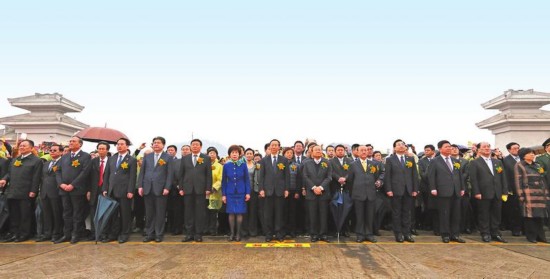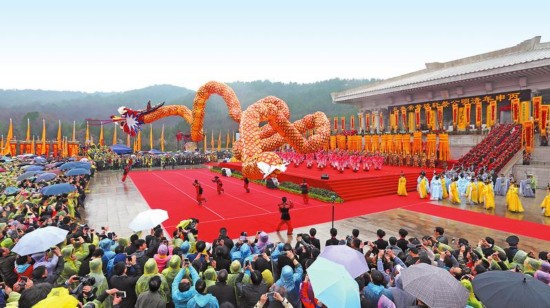Full coverage: Chinese Qingming Festival
Unification through a common ancestor - that's the thinking behind a Qingming gathering of more than 10,000 Chinese people in Shaanxi Province. They came from both home and abroad to pay their respects to Huang Di, better known as "The Yellow Emperor".

More than 10,000 Chinese people came from both home and abroad pay their respects to Huang Di, better known as "The Yellow Emperor".
Drums strike 34 times, one for each of the mainland's 31 provinces, municipalities and autonomous regions, as well as Hong Kong, Macao, and Taiwan. Huge bells ring out… echoing across the temple… Fifty-six dragon flags unfurl in the wind, representing China's ethnic groups.
The solemn style of worship and dance, which represent sacrificial activities, takes us back thousands of years, when the Yellow Emperor unified tribes along the Yellow River Valley and supposedly founded the Chinese nation and culture.

The solemn style of worship and dance, which represent sacrificial activities, takes us back thousands of years, when the Yellow Emperor unified tribes along the Yellow River Valley and supposedly founded the Chinese nation and culture.
This year’s attendees include scientists; talented young people; outstanding role models; overseas Chinese; and high-profile officials, including delegates from Taiwan, Hong Kong, and Macao.
"In Taiwan, we hold the memorial for the Yellow Emperor across the Strait. And now I am here to attend this ceremony, the feeling is very different," said Zhan Chunbo, Honorary Vice Chairman, Chinese Kuomintang.
Historians argue the Yellow Emperor unified the Yellow River basin and brought peace to China thousands of years ago. Many major advances were seen during his reign, including the origination of Chinese characters, musical instruments, medicine, and a counting system.
Historians believe sacrificial ceremonies dedicated to the Yellow Emperor started in 442 BC. Emperor Wu, of the Han Dynasty, held the largest recorded one. This year’s ceremony highlights how Chinese people inherited their unique civilization and continue to pursue a dream of rejuvenation.
"I am very proud to attend this ceremony, I hope realization of the Chinese nation is coming soon," one Qingming celebrant said.
"As an overseas Chinese, I am thrilled to attend this event. We are not only here to search for our roots, but also looking for more opportunities to better serve the country," said Liu Liying, president, Croatia Cultural Exchanger Center.
The ideal of the "Chinese Dream" -- initiated by Chinese President Xi Jinping in 2012 -- has integrated national and personal aspirations. It requires sustained economic growth, expanded equality, and an infusion of cultural values.















